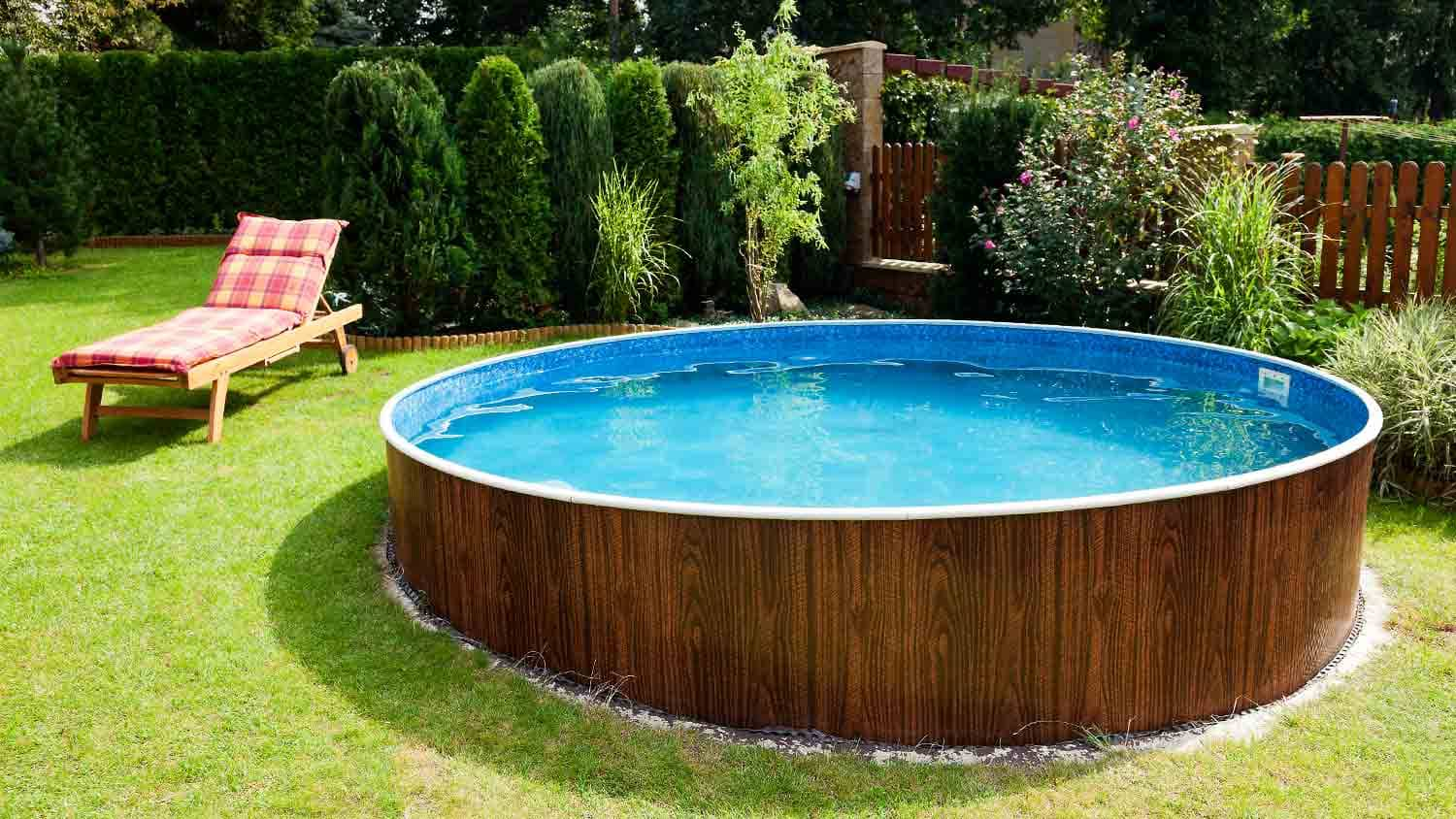Investing in an inground pool can provide years of enjoyment, but understanding the warranties that come with it is crucial. These warranties offer essential protection and peace of mind for pool owners.
In this article, we will delve into the intricacies of inground pool warranties, exploring the different types available and the specific coverage they offer for various pool types.
By understanding the limitations and evaluating key factors, pool owners can ensure the long-term value and enjoyment of their investment.
Key Takeaways
- Inground pool warranties come in different types, including manufacturer's warranty, workmanship or builder's warranty, and equipment warranty.
- The specific warranties for different types of inground pools vary, such as fiberglass pools having separate warranties for the structure and gel coat, vinyl liner pools having prorated warranties with limited coverage, and concrete pools relying on builder warranties.
- Inground pool warranties are important as they provide financial protection, peace of mind, help maintain property value, and protect against defects and structural issues.
- However, there are limitations to coverage, such as exclusions for normal wear and tear, limited coverage for cosmetic issues, exclusions for improper maintenance or installation, limited coverage for acts of nature, and exclusions for unauthorized modifications or repairs.
Types of Inground Pool Warranties
There are three types of inground pool warranties: manufacturer's warranty, workmanship or builder's warranty, and equipment warranty. Each type of warranty provides different coverage and protection for pool owners.
The manufacturer's warranty covers any defects or issues with the pool's structure or materials. This warranty is usually provided by the company that produces the pool and typically lasts for a certain number of years. It ensures that the pool is free from manufacturing defects and structural issues.
The workmanship or builder's warranty, on the other hand, covers the labor and materials used in the construction of the pool. This warranty is usually provided by the pool builder and can vary in length and coverage. It protects against any issues that may arise due to improper installation or construction.
Lastly, the equipment warranty covers the pool's equipment such as pumps, filters, and heaters. This warranty is usually provided by the manufacturer of the equipment and ensures that they are free from defects and will function properly.
When considering inground pool warranty options, it is important to carefully review the specifics of each warranty. This includes the length of coverage, any exclusions or limitations, and the process for filing a warranty claim. It is also important to consider the reputation and financial stability of the warranty provider, as well as the availability of local service and support.
Specifics of Inground Pool Warranties for Different Pool Types
Inground pool warranties for different pool types have specific details and coverage that pool owners should be aware of. Understanding the specifics of inground pool warranties is crucial to ensure that pool owners receive the necessary coverage and protection for their investment.
For fiberglass pools, there are typically two warranties provided. One warranty covers the structure of the pool, including any structural defects or issues that may arise. The second warranty covers the gel coat, which is the smooth, glossy surface of the pool. It is important to carefully review the terms of these warranties, as they may have different coverage periods and exclusions.
On the other hand, vinyl liner pools often come with prorated warranties. These warranties typically provide full coverage for the first few years, but the coverage may decrease over time. It is important to understand the specific terms of these warranties, including any limitations or exclusions.
Concrete pools, unlike fiberglass and vinyl liner pools, do not typically come with manufacturer warranties. Instead, the warranties for concrete pools are typically provided by the builder and cover the labor and materials used during construction. It is important to carefully review the terms of these warranties to understand the coverage provided.
When reviewing pool warranty terms, it is essential to consider factors such as the length of warranty coverage, transferability of the warranty, reputation and financial stability of the warranty provider, specific coverage details and limitations, and the availability of local service and support. By considering these factors, pool owners can make informed decisions and choose the best warranty for their needs.
Importance and Benefits of Inground Pool Warranties
Understanding the importance and benefits of inground pool warranties is essential for pool owners to protect their investment and ensure peace of mind. Pool installations can be a significant financial investment, and having a comprehensive warranty in place provides financial protection in the event of repairs or replacements. One of the key benefits of inground pool warranties is the peace of mind they offer. Knowing that your pool is covered against manufacturing defects and structural issues can alleviate concerns about potential problems down the line.
Inground pool warranties also help to maintain the value of the property. A well-maintained pool can be a selling point for homeowners, and having a warranty in place demonstrates that the pool has been constructed with quality materials and workmanship. Additionally, some warranties may also cover additional features such as pumps, filters, and heaters, adding further value to the warranty coverage.
However, it is important to note that inground pool warranties do have coverage limitations. These limitations may include exclusions for normal wear and tear, limited coverage for cosmetic issues, exclusions for improper maintenance or installation, and limited coverage for acts of nature. It is crucial for pool owners to thoroughly review the warranty terms and conditions to understand what is covered and what is not.
In the next section, we will explore the coverage limitations of inground pool warranties in more detail, highlighting the specific exclusions and limitations that pool owners should be aware of.
Coverage Limitations of Inground Pool Warranties
When it comes to inground pool warranties, it is important to understand the coverage limitations that may apply. One common limitation is the exclusion of cosmetic damage, meaning that issues such as fading or staining may not be covered.
Additionally, there may be limited coverage for maintenance-related problems, such as chemical imbalances or improper cleaning.
Lastly, acts of nature, such as storms or earthquakes, are often excluded from coverage.
Pool owners should carefully review the warranty terms to understand these limitations and ensure they have appropriate coverage for their specific needs.
Exclusions for Cosmetic Damage
One common limitation in inground pool warranties is the exclusion of cosmetic damage. While warranties typically cover structural issues and manufacturing defects, they often exclude coverage for purely cosmetic concerns. This means that if your pool develops surface stains, discoloration, or minor scratches, you may not be able to rely on the warranty for repairs or replacements. Cosmetic damage is generally considered normal wear and tear, which is not covered by most warranties. To understand this limitation better, take a look at the table below:
| Cosmetic Damage Exclusions |
|---|
| Surface stains |
| Discoloration |
| Minor scratches |
It's important to carefully review the warranty terms and conditions to fully understand the extent of coverage for cosmetic damage. Consider taking preventive measures, such as regular cleaning and maintenance, to minimize the risk of cosmetic issues that may not be covered by the warranty.
Limited Coverage for Maintenance
Limited coverage for maintenance is another important aspect to consider when evaluating inground pool warranties. While warranties provide financial protection for repairs and replacements, it is crucial to understand the limitations of coverage for ongoing maintenance. Here are four key points to keep in mind:
- General wear and tear: Inground pool warranties often exclude coverage for normal wear and tear, such as fading or discoloration of pool surfaces.
- Cosmetic issues: Some warranties have limited coverage for cosmetic issues, such as minor cracks or surface imperfections.
- Improper maintenance: If the pool owner fails to properly maintain the pool according to manufacturer guidelines, the warranty coverage may be voided.
- Acts of nature: Inground pool warranties may not cover damage caused by severe weather events, such as storms, hurricanes, or earthquakes.
Understanding these coverage limitations will help pool owners make informed decisions and properly maintain their inground pools to ensure longevity and minimize potential repair costs.
Acts of Nature Exclusions
Inground pool warranties often exclude coverage for damage caused by severe weather events, which is known as acts of nature exclusions. This means that if your pool is damaged by a hurricane, tornado, or other natural disasters, you may not be eligible for warranty coverage. Acts of nature exclusions are common in inground pool warranties because these events are considered unpredictable and beyond the control of the manufacturer or installer.
It is important to carefully review the warranty terms and conditions to understand the extent of coverage for acts of nature. While some warranties may offer limited coverage for these events, others may exclude them entirely. Considering the potential risks and costs associated with damage from severe weather, it is important to evaluate the acts of nature exclusions when selecting an inground pool warranty. This will help you make an informed decision and ensure that you have appropriate coverage for your pool.
Moving forward, let's now discuss the factors to consider when evaluating inground pool warranties.
Factors to Consider When Evaluating Inground Pool Warranties
When evaluating inground pool warranties, it is essential to take into account various factors that can greatly impact the coverage and protection provided. Here are some key factors to consider:
- Length of warranty coverage: The duration of the warranty is crucial as it determines how long you will be covered for any potential repairs or replacements. Longer warranty periods offer more extended protection and peace of mind.
- Transferability of the warranty: If you plan to sell your property, a transferable warranty can be highly beneficial. It allows you to transfer the warranty to the new owner, adding value to your property and providing assurance to potential buyers.
- Reputation and financial stability of the warranty provider: Research the warranty provider's reputation and financial stability. Opt for a reputable company with a solid track record and financial strength to ensure that they will be able to honor the warranty if needed.
- Specific coverage details and limitations: Carefully review the warranty's terms and conditions to understand what is covered and what is not. Pay attention to any exclusions, limitations, or conditions that may impact your ability to make a claim.
Steps to Take for Warranty Claims
When it comes to warranty claims for inground pools, proper documentation is crucial. Pool owners should document the issue with photographs and a written description to provide evidence of the problem.
It is also important to follow the specified claim process and provide all necessary documentation to ensure a smooth and successful claim. By cooperating with any inspections or evaluations required by the warranty provider and keeping records of all communication and documentation, pool owners can increase their chances of a favorable resolution.
Documentation for Warranty Claims: What to Include
To ensure a smooth and successful warranty claim process, pool owners should compile comprehensive documentation that includes photographs and a written description of the issue. This documentation is crucial for the warranty provider to assess the problem and determine if it is covered under the pool warranty.
When preparing the documentation for pool warranty claims, pool owners should consider the following:
- Photographs: Take clear and detailed photographs of the issue from various angles. This will provide visual evidence of the problem and help the warranty provider understand the extent of the damage.
- Written Description: Provide a written description of the issue, including when it was first noticed, any relevant details about the pool's maintenance history, and any steps taken to address the problem. Be as specific and detailed as possible to ensure a thorough understanding of the issue.
- Date and Time Stamp: Include the date and time when the issue was discovered and documented. This helps establish a timeline of events and provides a reference point for the warranty claim process.
- Any Additional Supporting Documentation: If there are any additional documents related to the issue, such as receipts for repairs or maintenance records, include them in the documentation. These can further support the warranty claim and provide additional context for the warranty provider.
Importance of Following Claim Process
To ensure a smooth resolution to any pool-related issues covered under their warranty, pool owners must adhere to the specified claim process and follow the steps provided by the warranty provider or installer.
This is important because failing to follow the proper claim process may result in the denial of the warranty claim.
When experiencing a problem with their inground pool, pool owners should first document the issue with photographs and a written description. Then, they should contact the warranty provider or installer to initiate the claim.
It is crucial to follow the specified claim process and provide all necessary documentation. Additionally, pool owners should cooperate with any inspections or evaluations required by the warranty provider.
Keeping records of all communication and documentation related to the claim is also essential. By following these steps, pool owners can maximize their chances of a successful warranty claim and a resolution to their pool issues.
In the next section, we will explore key terms and conditions to watch for in inground pool warranties.
Key Terms and Conditions to Watch for in Inground Pool Warranties
Inground pool warranties contain key terms and conditions that pool owners should carefully review and understand. These details can greatly impact the coverage and protection provided by the warranty. Here are some important key terms and conditions to watch for in inground pool warranties:
- Coverage Limitations: It's crucial to understand the limitations of the warranty. This includes exclusions for normal wear and tear, limited coverage for cosmetic issues, exclusions for improper maintenance or installation, and limited coverage for acts of nature. Knowing these limitations will help you manage your expectations and avoid any surprises in the future.
- Length of Warranty Coverage: The length of the warranty coverage varies among different manufacturers and builders. Some warranties may offer coverage for a specific number of years, while others may have lifetime coverage. Understanding the duration of the warranty will help you plan for any potential repairs or replacements in the future.
- Transferability: Check whether the warranty is transferable to a new owner if you decide to sell your property. This can be an important factor to consider, as it adds value to your property and provides peace of mind to potential buyers.
- Claim Process: Familiarize yourself with the claim process outlined in the warranty. This includes documenting the issue with photographs and written descriptions, contacting the warranty provider or installer, following the specified claim process, and providing all necessary documentation. Understanding the claim process will ensure that you can efficiently and effectively navigate any warranty claims that arise.
Importance of Proper Maintenance for Upholding Inground Pool Warranties
Proper maintenance plays a crucial role in upholding inground pool warranties. The importance of proper maintenance for upholding inground pool warranties cannot be overstated. By adhering to a regular maintenance schedule, pool owners can ensure that their pool remains in optimal condition and that any potential issues are addressed promptly. This not only helps to extend the lifespan of the pool but also ensures that the warranty remains valid.
Regular maintenance includes tasks such as cleaning the pool, checking and balancing the water chemistry, inspecting and servicing the pool equipment, and addressing any repairs or issues as they arise. By regularly cleaning the pool, debris and dirt are removed, preventing clogs and potential damage to the pool's filtration system. Balancing the water chemistry helps to prevent the growth of algae, bacteria, and other contaminants, which can cause damage to the pool structure and equipment.
Regular inspections and servicing of the pool equipment, such as pumps, filters, and heaters, are also essential. This helps to identify any potential issues early on and address them before they become major problems. By addressing repairs promptly, pool owners can prevent further damage to the pool and its components, ensuring that the warranty remains intact.
In addition to upholding the warranty, proper maintenance also has other benefits. It helps to maintain the value of the property by keeping the pool in good condition. It also ensures the safety and enjoyment of those using the pool, as regular maintenance helps to prevent accidents and potential health hazards.
Frequently Asked Questions
Are Inground Pool Warranties Transferable if I Decide to Sell My Property?
Inground pool warranties may or may not be transferable if you decide to sell your property, as it depends on the specific terms and conditions of the warranty.
Some warranties may allow for a transfer of coverage to a new owner, while others may not.
It is important to carefully review the warranty documentation or contact the warranty provider to determine if the warranty can be transferred and if any additional steps or fees are required to do so.
Can I Purchase Additional Coverage for My Inground Pool Warranty?
Yes, it is possible to purchase additional coverage for your inground pool warranty.
Many warranty providers offer optional add-ons or extended coverage plans that can be purchased to enhance the protection for your pool.
These additional coverages may include extended warranty periods, increased coverage limits, or added protection for specific pool components or features.
It is important to carefully review the terms and conditions of any additional coverage options to ensure they meet your specific needs and budget.
What Types of Maintenance Tasks Are Typically Required to Uphold an Inground Pool Warranty?
To uphold an inground pool warranty, regular maintenance tasks are typically required. These tasks may include:
- Ensuring proper water chemistry by testing and balancing the pool's pH and sanitizer levels regularly.
- Cleaning the pool regularly to remove debris and maintain proper circulation.
- Following the manufacturer's guidelines for filter cleaning and maintenance.
- Inspecting and maintaining equipment such as pumps, filters, and heaters.
Adhering to these maintenance tasks will help fulfill the requirements of an inground pool warranty.
Are There Any Specific Limitations on Coverage for Acts of Nature, Such as Hurricanes or Earthquakes?
Yes, there are specific limitations on coverage for acts of nature, such as hurricanes or earthquakes, in inground pool warranties.
While each warranty may have different terms and conditions, it is common for acts of nature to be excluded from coverage.
This is because these events are considered unavoidable and beyond the control of the warranty provider.
It is important for pool owners to review their warranty documents carefully to understand the extent of coverage for acts of nature and any other limitations that may apply.
How Long Does It Typically Take for a Warranty Claim to Be Processed and Resolved?
The typical duration for processing and resolving a warranty claim on an inground pool can vary depending on several factors. These factors include the complexity of the issue, the responsiveness of the warranty provider, and the availability of necessary replacement parts.
In general, it is recommended to document the issue thoroughly, contact the warranty provider promptly, and follow the specified claim process diligently to ensure a timely resolution.
However, it is important to note that specific timeframes may vary and are usually outlined in the warranty terms and conditions.



